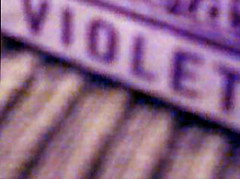Bergman, S. Bear. Butch is a Noun. San Francisco: Suspect Thoughts Press, 2006.
This sweet little book is gender studies, personal memoir, and butch training manual all in one. It contains the life lessons and love songs of one individual butch, spiced with acceptance for all kinds of gender presentation. It's the self-fashioning of a kind of butch that I almost find hard to believe exists in this era in which manners are a rare suprise. Bear*'s butch presentation and chivalrous charm feel profoundly intimate.
Butch is a Noun covers topics as private as cocks and breasts and as public as shopping in simple, straightforward essays that craft a description of how one particular butch navigates hir identity in the world. Bear does not, in defending hir own butchness, fall into the deadly trap of denigrating others' identities. Hir piece on butch/trans "border wars" is thoughtful annd sensitive while appreciating everyone's choices. In fact, the only harsh words Bear seems to have for anyone are for those so hurt by a world that tried to force them into femininity that they act out misogyny in order to distance themselves from womanhood. Even those harsh words turn gentle and corrective rather than punitive.
In describing butch, Bear also paints a picture of femme, and it is a lovely illustration filled with all the love and desire and hope for what a femme can be. Ze carefully avoids speaking for femmes while encouraging them to speak for themselves and offering appreciation for many things that femmes are. Ze demonstrates a subtle awareness of the ways in which hir butch identity makes it possible for femmes to move in the world. Not in safety on the streets, though ze discusses that, but in comfort and pride with their own femininity, which is so often almost as hard to navigate as butch masculinity. I would be delighted if this book helps to raise future generations of queer kids believing in butch and femme dynamics and the seductive dance of their potential for mutual appreciation.
Despite the love and appreciation lavished on femmes throughout the book, Bear in no way suggests that butch and femme are necessarily paired. Ze describes hir affection and ways of interacting with butches and transmen as equally loving, equally beautiful. Ze explores the many ways of being masculine together, in shopping and wrestling and friendship and sex, and reminds us that loving one does not necessarily mean not loving others.
Unfortunately, I will not be able to demonstrate the simple beauty of Butch is a Noun's language or the brilliant intimacy of its subject matter, because the moment I finished the book I passed it on to someone who might enjoy it. It's the kind of book that needs to be out circulating in the world, training young butches and warming the hearts of femmes who sometimes need to believe that such butches exist. And maybe it will reach others at just the right time to serve as a text of mentoring and love, carving a patch for future butches and femmes to follow, paving the way to a country in which butch is a noun and a gender all its own, and those who choose to practice it do so with the bravery and aplomb that Bear models throughout hir book. It's a beautiful book and I heartily recommend it to anyone who identifies with nouns such as butch or femme, or with forms of masculinity that draw upon ideals of chivalry.
*Forgive me the first name basis. The book feels so personal, that though Bear has never met me, I would very much like the privilege of calling hir by hir first name. Bergman, though correct, feels too formal on this particular occasion and I sincerely hope Bear will forgive me the transgression.
Purple Rain
-
I went to Minneapolis to check out the stage version of *Purple Rai*n.
There were many issues but the one that sticks in my craw a month after
seeing the...
1 week ago

0 comments:
Post a Comment